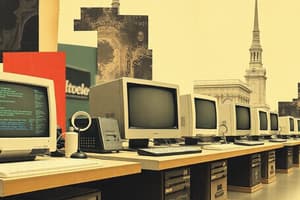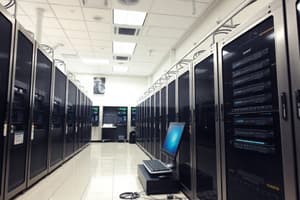Podcast
Questions and Answers
Which part of the information processing cycle involves accepting data from a user or a program?
Which part of the information processing cycle involves accepting data from a user or a program?
- Output
- Processing
- Input (correct)
- Storage
What is referred to as the set of instructions provided to perform operations on data?
What is referred to as the set of instructions provided to perform operations on data?
- Data Processing
- User Input
- Information Cycle
- Computer Program (correct)
What occurs during the output part of the information processing cycle?
What occurs during the output part of the information processing cycle?
- Raw data is accepted for analysis.
- Instructions are processed.
- Results are displayed or transmitted. (correct)
- Data is permanently stored.
Which component of a computer system is responsible for the physical parts and devices?
Which component of a computer system is responsible for the physical parts and devices?
Which of the following is NOT considered a mandatory step in the information processing cycle?
Which of the following is NOT considered a mandatory step in the information processing cycle?
What is a key distinction between data and information?
What is a key distinction between data and information?
Which characteristic is NOT typically associated with computers?
Which characteristic is NOT typically associated with computers?
How have computers evolved over time?
How have computers evolved over time?
What is one function a computer performs as a data processor?
What is one function a computer performs as a data processor?
In which application is a computer NOT commonly used?
In which application is a computer NOT commonly used?
Flashcards are hidden until you start studying
Study Notes
Introduction to Computer Systems
- Computers have evolved from large machines to compact designs with advanced technology.
- Computers are used in various fields like engineering, medicine, commerce, and research.
Computer as a Data Processor
- Raw, unorganized facts are called data.
- Data becomes information when processed, structured, and presented in a meaningful context.
- Computers convert data into information through the information processing cycle.
The Information Processing Cycle
- The information processing cycle involves four parts:
- Input: Data is received from a source like the user or a program.
- Processing: Data is manipulated based on instructions from a program.
- Output: Processed information is displayed as text, numbers, graphics, etc.
- Storage: Processed information is permanently stored on a storage medium.
Hardware & Software
- Hardware refers to the physical components of a computer system, such as electronic circuits, storage media, and input/output devices.
- Software consists of programs, procedures, and documentation used to operate a computer system.
- Hardware and software work together to perform tasks.
Classification of Computers
- Computers can be classified based on their logic and capabilities.
- Analog computers: Use continuous measurements to represent data.
- Digital computers: Process data as discrete signals, represented as 1s and 0s.
Digital Computer Classifications
- General Purpose Computers: Used for various applications like accounts, payroll, and data processing.
- Special Purpose Computers: Designed for specific tasks, like those used in automobiles or microwaves.
- Microcomputers (PCs): Small, low-power computers, widely used for office automation and professional applications.
- Notebook and Laptop Computers: Portable, battery-operated computers with powerful processors and graphics capabilities.
- Handheld Computers: Used for field data collection and other specific applications.
- Mini Computers: More powerful than microcomputers with higher memory and storage capacity.
- Mainframe Computers: Large, high-speed computers used in large organizations and government departments for complex data processing.
- Super Computers: Fastest, most powerful, and expensive computers used for specialized tasks requiring immense computational power. They often utilize parallel processing techniques.
Importance of Computers
- Computers play a crucial role in society, impacting various aspects of daily life and technological advancements.
- They are essential for research, communication, entertainment, and countless other fields.
Studying That Suits You
Use AI to generate personalized quizzes and flashcards to suit your learning preferences.





